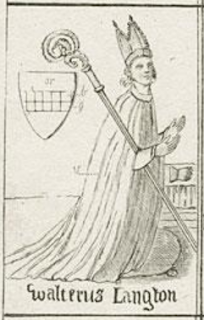Winchelsey (from Winchelsea, whose seal appears here) studied at the University of Paris (where he might have met Thomas Aquinas) and at Oxford. In 1283 he was made a canon of St. Paul's in London. When the Archbishop of Canterbury, John Peckham, died in 1292, Winchelsey was elected to replace him. He could not be confirmed, however, because although he went to Rome to receive the pallium, there was no pope at the time. He could not be consecrated archbishop until after the election of Celestine V.
When he returned to England and swore an oath of loyalty to King Edward, he added his own qualifier, that he was loyal "only regarding the king's temporal decisions and power, not regarding spirituality." Edward's anger with him continued when Winchelsey refused to have the clergy give up the percentage of taxes the king demanded to finance his administration and his wars with France. Winchelsey did allow one tenth of ecclesiastical revenues to go to the king in 1295, and that if the war continued into a second year he might consider more funding.
Things changed in 1296, however, with Clericis laicos, a papal bull forbidding church taxes to secular powers. Winchelsey told his clergy that further taxes were not to be paid to the agents of the king. York, however, allowed the king one-fifth of their revenue, a precedent that made it easier for Edward to declare any clergy who did not pay taxes to be outlaws, and that their property would be seized. The outlaws would be forgiven and return to his good graces if they paid a fine of ... (wait for it) ... one-fifth of their revenues. Winchelsey told the clergy it was up to them if they wanted to pay. Slowly, the clergy gave in.
All except Winchelsey himself. Edward seized his lands, but the two were reconciled in July 1297. At that point, Winchelsey tried to mediate between the king and his earls, who also objected to so much taxation. Speaking of money, Winchelsey clashed with Edward's chief advisor, his Treasurer Walter Langton. Langton was the Bishop of Lichfield, but unlike Winchelsey he placed his loyalty to the king above his loyalty to the church.
In fact, Langton was one of two men sent by Edward to the pope to complain that Winchelsey was plotting against the king. How that turned out will be a subject for next time.


